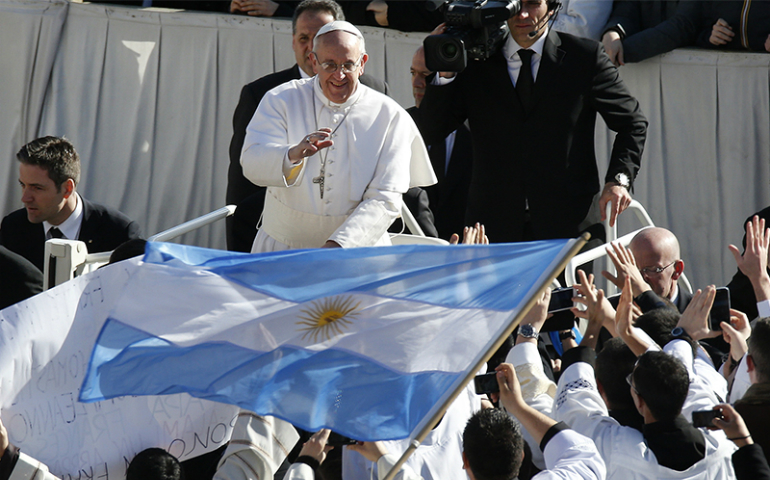
Pope Francis approaches priests with an Argentine flag as he arrives in St. Peter's Square for his inaugural Mass at the Vatican on March 19, 2013. (Reuters/Stefano Rellandini)
The Polish pope, St. John Paul II, made nine visits to his country of birth, the first in 1979, less than a year after his election.
His successor, Pope Emeritus Benedict XVI, went to his native Germany three times, including on his first international trip.
And the first Argentine pontiff? Francis hasn’t been back once since he became pope four years ago.
It’s not as though there haven’t been good reasons to come. Last year was the bicentennial of Argentine independence from Spain. There was also the beatification of Blessed Maria Antonia de Paz y Figueroa, an Argentine nun affectionately known as Mama Antula, and the canonization of the “Gaucho Priest,” St. Jose Gabriel Brochero.
“You don’t know how much I want to come back and see you,” the pope said in a video addressed to the Argentine people last September, adding that he had hoped to return to preside over those events.
But he surprised many by saying he also wouldn’t be able to return this year either because “there are already commitments” for trips to Asia and Africa.
“The world is bigger than Argentina,” he reminded them.
Although the pope felt compelled to apologize for his no-show, it’s also no exaggeration to say there’s no clamor for a visit.
In fact, many people attending a Mass last Ash Wednesday at the Church of the Immaculate Conception in Tigre, a suburb of Buenos Aires, appreciated his absence.
“I don’t mind, and in fact I am grateful to him (for staying away) because it would be used politically,” said Leonor, a 73-year-old retiree who wouldn’t give her last name.
Some people expected a stop in Argentina when Francis traveled to Paraguay and Bolivia in 2015. But at the time, the election campaign for who would succeed former President Cristina Fernandez de Kirchner was in full swing.
And this year, the nation is caught up in campaigning for legislative elections scheduled for October.
“Clearly the political situation in our country is not conducive to a papal visit,” said 78-year-old retiree Juan Parmaggiani on his way into the church. “I think it’s good that he doesn’t come for now.”
Last year, Francis was careful not to take sides in the general election and the center-right mayor of Buenos Aires, Mauricio Macri, defeated Daniel Scioli, who belonged to Kirchner’s Justicialist party.
However the pope’s progressive views, and especially his support for social movements, are seen by many in Tigre, an affluent town that went for Macri, as putting him at odds with the current president.
To be sure, as archbishop of Buenos Aires, then-Cardinal Jorge Mario Bergoglio had many rocky moments with former president Kirchner. He opposed Argentina’s move in 2010 to become the first Latin American country to legalize same-sex marriage, and he frequently protested her policies and their impact on the poor in particular.
But some now see Francis as more in sync with the Kirchner past than the Macri present.
“I don’t mind that he doesn’t come. He has a thousand things to do,” said Augustina Iudica, a 29-year-old English teacher who likes the pope’s emphasis on humility.
“I know many people are upset,” she added. “In fact, I work at a very religious Catholic school in which the faculty are very upset that he defends the former government and because of Milagro Sala.”
Sala, leader of the Tupac Amaru indigenous rights group, has been in detention for more than a year in Jujuy province, which is governed by an ally of President Macri. Sala’s supporters say she’s a “political prisoner,” and Amnesty International has demanded her release.
After she was arrested, the pope, who had received Sala at the Vatican in 2014, sent her a rosary as a gesture of support.
It’s such actions that Argentines on both sides of the political divide interpret as revealing Francis’ political leanings in favor of more left-leaning activists and movements.
Clelia Isasmendi of the the Helder Camara Movement for Peace between Religions and Peoples, recalled that after the removal of Brazil’s leftist leader Dilma Roussef, the pope said he wasn’t sure he would be able to attend the 300th anniversary ceremony this year for the Virgin of Aparecida, the country’s patron saint, as he has promised.
“That tells us where he stands,” she said, adding that she didn’t see the pope coming to Argentina “while there are neoliberal governments” — that is, those seen as favoring free enterprise policies over social justice — “that go against Christianity.”

